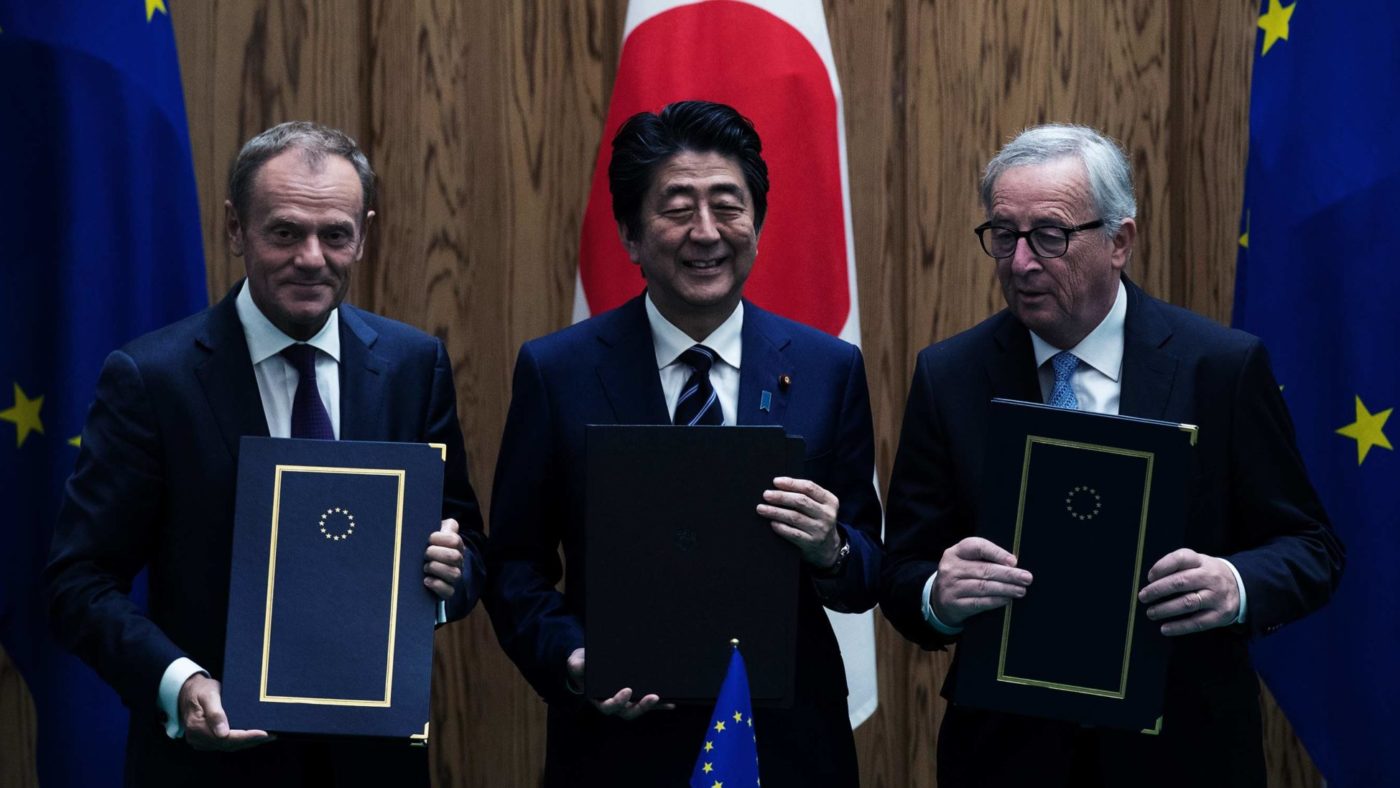It’s not often the Brussels bureaucracy does something truly praiseworthy, but this week’s signing of a free trade agreement between the EU and Japan, is indeed good news.
The deal, which almost eliminates all tariffs between the EU and the second largest economy in Asia, is just one part of a bigger effort from Brussels to sign off a series of big free trade agreements. Confronted by an unapologetic protectionist in Donald Trump, Europe’s leaders have realised they need to get their act together.
The EU has recently concluded FTAs with South Korea, Canada, and now Japan, and is negotiating with Mexico, Australia, Singapore, and Mercosur, an alliance of Latin American countries that includes Argentina and Brazil. Just this week, the first round of negotiations with New Zealand took place. As reporter Nick Gutteridge observed: “Barring a truly miraculous reversal in attitude, the shot of adrenalin Trump has injected into the EU’s trade policy will be by some margin his greatest legacy to Europe”.
It’s far too early to say that Brussels has suddenly become a staunch advocate of free trade, given its well-documented protectionist tendencies. Looking at the list of agreements the EU already has in place makes the case for action obvious. While smaller economies are well-represented, major players are almost completely absent.
Compare the EU’s list with independent Switzerland, which has struck deals with Korea, Japan, the Gulf states, the Philippines and, most importantly of all, China. The Swiss are also in negotiations with Mercosur, but at the same time have set their sight as well on India and other rising economies like Indonesia and Vietnam.
As Brexiteers have often pointed out, Brussels has formed a protectionist wall which gives no freedom to its member states to do trade deals on their own. This was the reason why Estonia, which previously boasted one of the most free-market trade policies in the world, had to adopt the tariff policy of the EU when they joined.
This is the reason why the UK and Germany couldn’t simply have an FTA on their own post-Brexit, despite there being no objection to it in principle. And this is the reason why it has not been possible for Britain to have free trade with the US. The EU’s tariffs are not insubstantial – for once Donald Trump is right when he says that tariffs on US imports to the EU have been much higher than on European exports to America.
The EU response to Trump’s trade war has also made clear that its leaders just do not understand the benefits of free trade. While Trump is undoubtedly the villain of the piece, Brussels has played a significant role in exacerbating the crisis, constantly creating lists of American goods that will be slapped with retaliatory tariffs. Those lists, which the EU calls “rebalancing measures”, are probably quite fun for bureaucrats to compile, but they will hurt both the poorest Americans as well as every European consumer.
The reason for all this is because the European leaders have views on free trade that are almost akin to the tit-for-tat mercantilism of past ages. In this worldview, free trade with the US is only good if the US is participating in it. If the US puts up barriers, sticking with our own free trade policy would be harmful. By the same token, trade with China is beneficial, but when China tries to buy shares in European companies, Emmanuel Macron will immediately start demanding “foreign investment screenings”.
As virtually any economist would agree, free trade is a win-win situation. The fact Donald Trump cannot get this into his head does not mean Europe should give up on free trade as well. Both European and American consumers and companies will still profit and be better off from at least one side not demanding tariffs. The same is true of Brexit Britain – there is no obligation to levy big tariffs on imports, and British consumers will be much better off if their government pursues unilateral free trade.
Equally, if a member state – Estonia, say – had its own trade policy it wouldn’t hurt anyone else in the EU, aside from putting pressure on them to follow suit – and if free trade is so great, what’s the problem with that? Again though, the EU has a misguided view of competition between states, which it is forever trying to eliminate through harmonisation efforts. In reality, state competition is one of the main ways to achieve good governance.
This was also one of the main reasons why Britain decided to leave the European Union: to open to the world, to have free trade agreements with the US, Australia, New Zealand – perhaps even unilateral free trade with everyone, for a Global Britain, to paraphrase the now former Foreign Secretary. It was encouraging to see Trade Secretary Liam Fox announcing a few days ago that Britain would be focusing on getting trade deals with those three traditional allies and would look at joining the Trans-Pacific Partnership.
Ironically, just as Britain seeks to forge its own path, the EU seems to have found a measure of some common sense on trade policy. It is now leading the charge on FTAs around the world with the possibility of many more pompous signing ceremonies to come. But Britain need not fear it is missing out – as long as the Government dares to pursue a clean Brexit, it can follow and easily outperform Brussels, and become a powerhouse of international free trade.


